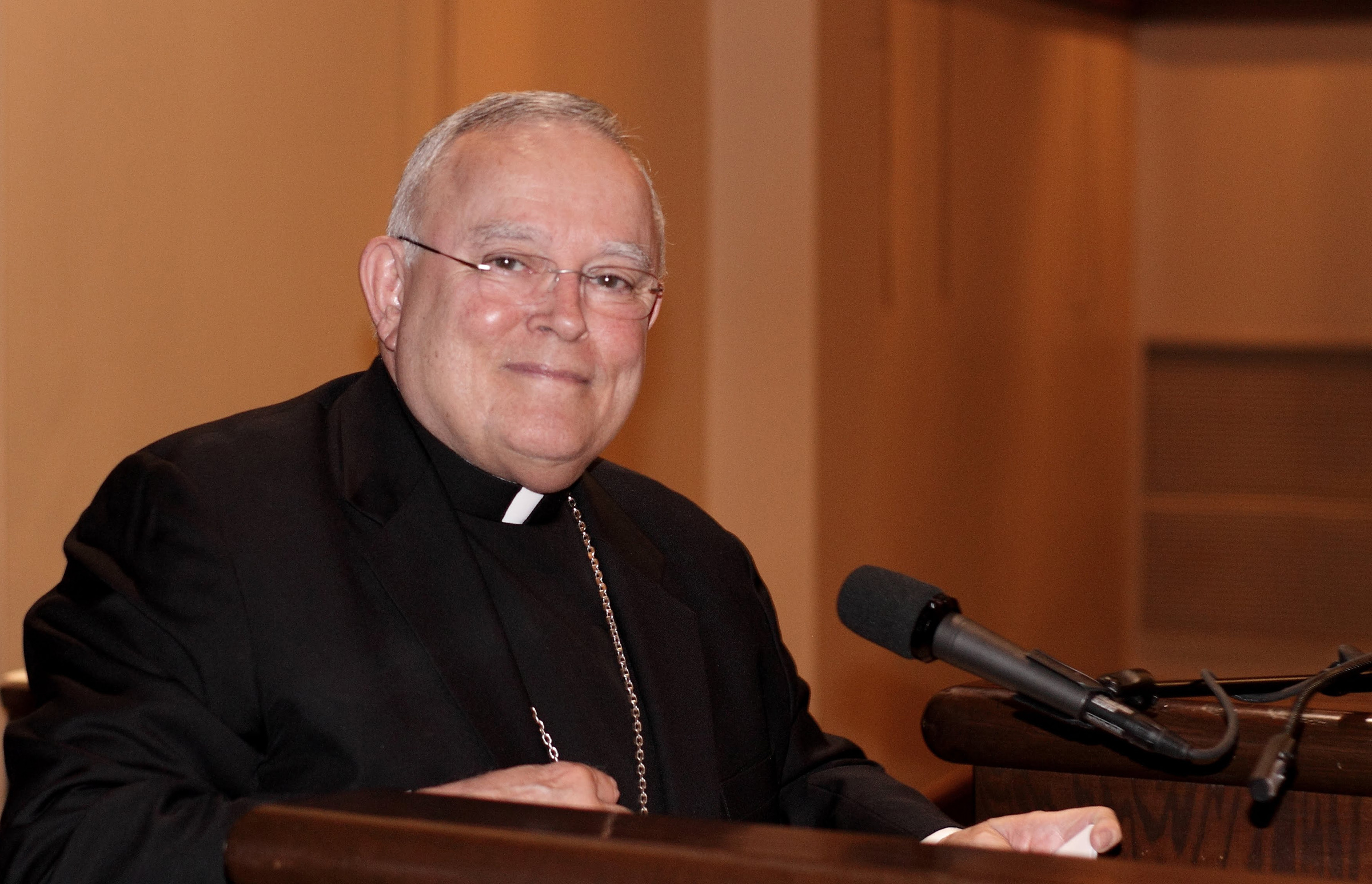
Philadelphia Archbishop Charles Chaput smiles during a March 27 address at the Pontifical College Josephinum in Columbus, Ohio. (CNS/Courtesy of Pontifical College Josephinum)
Little Logan Vincent, three months old, was the star at Mass Sept. 8 at St. Vincent de Paul Church in the Germantown section here.
To the sounds of a Gospel choir, to the ringing applause of a church three-quarters filled, and with his parents and godparents processing around the sanctuary with little Logan in his mother's arms, greeted by kisses from the pews, this was no back-of-the-church, move along quickly ceremony. It was topped off by testimony from Christine Vincent, his mother, about the grueling ordeal that brought Logan into the world, including months for both mother and child in the hospital.
Logan is entering a church in transition.
After eight years, Archbishop Charles Chaput's tenure as Philadelphia archbishop will soon end. He has already presented his resignation notice to Pope Francis, consistent with church law as he marks his 75th birthday on Sept. 26. Francis will either accept it or ask him to continue until a successor is named.
Logan is among the approximately 11,000 Catholics in the Philadelphia Archdiocese who are expected to be baptized this year. That is in contrast to nearly 38,000 baptisms in 1961. Wracked by sex abuse and financial scandals, a once powerful church here has undergone painful consolidation and retrenchment. In comparison to past eras, far fewer Philadelphia Catholics are being baptized, married and buried in the church.
Philadelphia is feeling the effects of outside forces that have changed the landscape of the Catholic Church in the Northeast and Upper Midwest. In addition to the effects of scandal, the church has experienced a massive shift of populations not only away from urban centers but also to the areas of the South, the effects of smaller families and the general disaffiliation of young people from institutions, civil and religious.
Chaput is seen by his supporters as part of a new evangelization, countering that estrangement from the church via a focus on upholding church doctrine. Others see him as alienating Catholics on the margins.
The numbers tell a tale in this city, where people used to identify themselves not by neighborhood but by parish.
In his public statements, Chaput has regularly addressed the decline of Catholic influence in the nation in general and in Philadelphia in particular, with supporters seeing him as prophetic while critics see much doom and gloom.
"We need to discipline ourselves to be ready for God's grace," he said at a Los Angeles prayer breakfast in 2012.
"If our hearts are cold, if our minds are closed, if our spirits are fat and acquisitive, curled up on a pile of our possessions, then the church in this country will die. It's happened before in other times and places, and it can happen here," he said.
Chaput has handed in his retirement notice, the latest chapter in the history of this city's Catholic community, ending in far different circumstances than when it began.
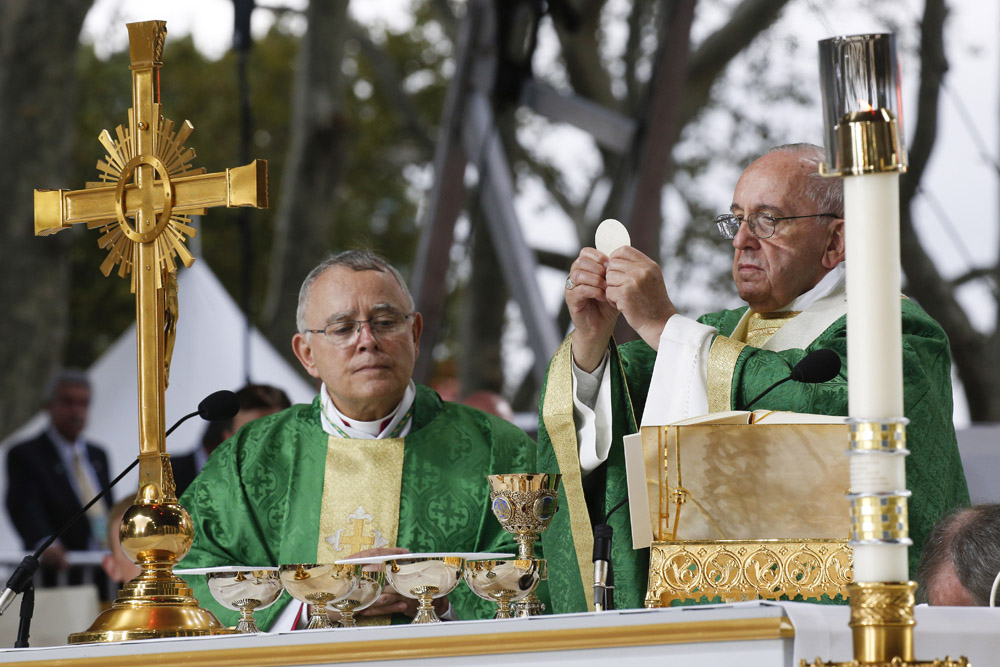
In this 2015 file photo, Pope Francis raises the Eucharist as he celebrates the closing Mass of the World Meeting of Families in Philadelphia. With him at the altar is Philadelphia Archbishop Charles Chaput. (CNS/Paul Haring)
At his inaugural Mass on Sept. 8, 2011, Chaput described his coming to Philadelphia as a kind of "an arranged marriage," with Pope Benedict as matchmaker. He was born in Kansas and had spent most of his life in the West, as a priest and later as bishop of Rapid City, South Dakota, and Denver.
"For any marriage to work," he added, "two things need to happen. People need to fall in love, and together they need to be fruitful. That's what we need to dedicate ourselves to today — to love one another and be fruitful together in the new evangelization."
In a city known for its toughness — football lore has it that even Santa Claus was once booed at an Eagles game — love would be a tall order. How fruitful that marriage has been is disputed among Philadelphia Catholics.
Chaput's appointment to Philadelphia raised eyebrows in some church circles, but in many ways it was a response to what was happening in Catholicism at the time. Pope Benedict spoke of a leaner, more orthodox church, consistent with Chaput's long participation in the U.S. culture wars. Appointed to an archdiocese recovering from damning grand jury reports on sex abuse released in 2005 and 2011, Chaput was known for successfully fighting changes in statutes of limitation legislation in Colorado, a struggle he successfully waged in Pennsylvania as well. At the time the U.S. bishops were clashing with the Obama Administration over issues such as contraception coverage in the Affordable Care Act. Donald Trump remained a reality television star.
And then Jorge Bergoglio became Pope Francis in 2013. Chaput hosted the pope on his American tour two years later, part of Francis' transformation in how the papacy is perceived.
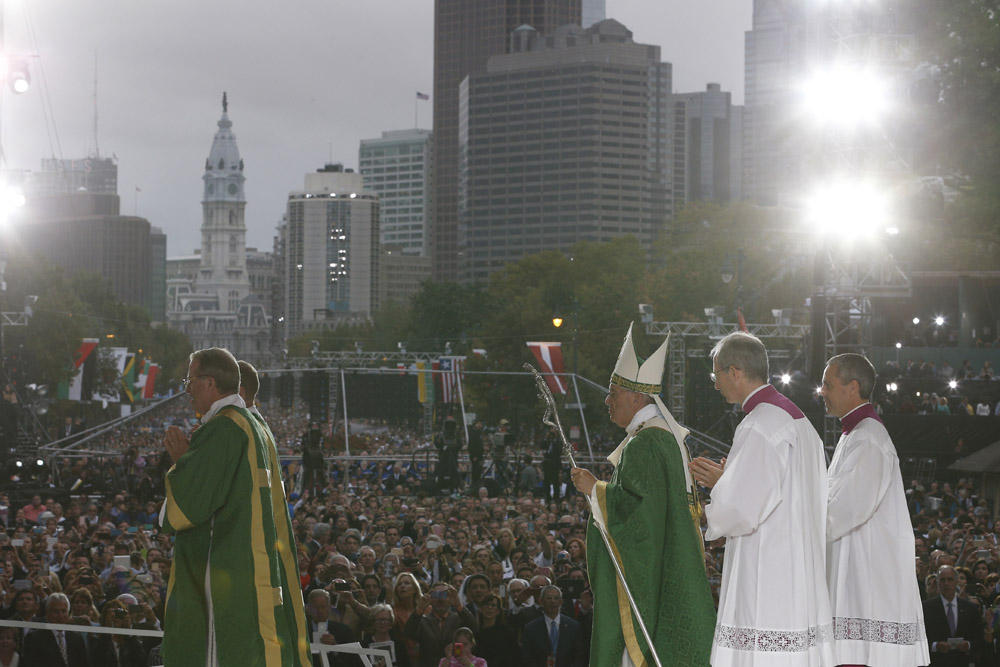
Pope Francis leaves in procession after celebrating the closing Mass of the World Meeting of Families on Benjamin Franklin Parkway in Philadelphia Sept. 27, 2015. (CNS/Paul Haring)
As Francis famously asked, "Who am I to judge?" and made a point of inclusion, American Catholic culture warriors responded, first with confusion and, later, in some quarters, outright opposition. Chaput spoke favorably about Archbishop Carlo Maria Viganò, the former papal nuncio who scathingly criticized Francis. Chaput asked pastors not to give Communion to those publicly violating church sexual teachings on marriage and gay relationships, seen widely as a rebuke to Francis' more opening stance to such Catholics.
And, whether Philadelphia has surrendered its ranking in the top echelon of U.S. Sees to growing archdioceses like Houston, or whether he was slighted by the pope, Chaput remains the first Philadelphia archbishop in a century not to be named a cardinal.
While Chaput continued to make headlines with his forays into the culture wars, regularly touching on hot button issues such as gay marriage and abortion, his legacy here has been a more circumspect one.
For Philadelphia Catholics, used to large building projects and regular expansion, the Chaput years have been an era of consolidation. Parishes have been closed and consolidated. Large swaths of church property have been sold off, including the archbishop's mansion and the land of St. Charles Seminary. The archdiocese has also sold cemeteries, nursing homes, and a beach house retreat used by priests on the New Jersey Shore.
"He is no Cardinal [Dennis Joseph] Dougherty*," noted Philadelphia church historian Patrick Hayes, citing the archbishop who oversaw many of the church buildings in the city and nearby suburbs during the first half of the last century.
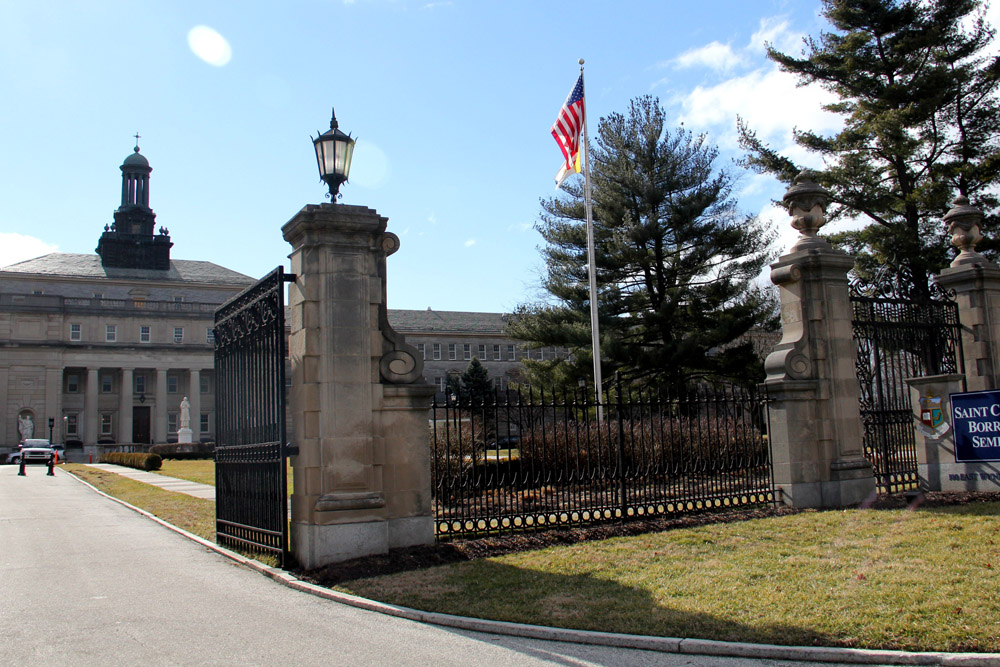
A U.S flag flies outside St. Charles Borromeo Seminary March 3, 2013, in Wynnewood, Pennsylvania. (CNS/Sarah Webb, CatholicPhilly.com)
"He's been far more fiscally restrained," said Hayes. In many ways, there was no other choice. Chaput came to Philadelphia to an archdiocese facing huge financial obstacles.
In an archdiocese wracked by scandal, Chaput avoided many of the accusations of cover-up and fiscal recklessness leveled at his two most recent predecessors, Cardinals Anthony Bevilacqua and Justin Rigali.
"He's been very proactive in dealing with clergy who've fallen on the wrong side of the law. He's let the civil authorities do their job," said Hayes.
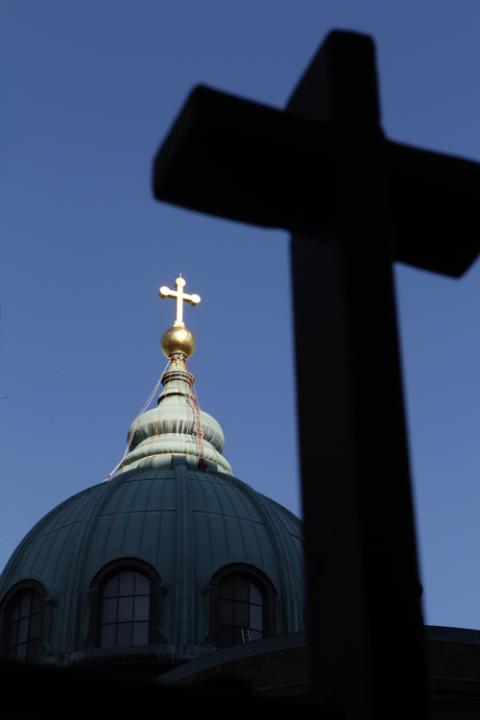
The gold cross and cupola of Philadelphia's Cathedral Basilica of Sts. Peter and Paul are pictured in this August 2011 file photo. (CNS/Nancy Phelan Wiechec)
The city itself has been transformed. Its older neighborhoods are now popular with a new generation of young adults seeking an East Coast cultural enclave with relatively low costs. It has a growing Latino population, many of whom are Catholic.
Still many of the church and school closings and consolidations have taken place in the city. The archbishop has overseen "a once powerful urban church straight into the suburbs," said Hayes.
Evangelization efforts, he said, have focused on attracting younger people who are accepting of church teaching on sexual ethics. For many of Philadelphia's new young urbanites, "they are living lives that don't put them into the pews," said Hayes.
Chaput's reputation as a culture warrior generated pushback among a sizeable portion of his flock.
While the doctrine may not differ from Francis, some see it as placed in the context of a less-than-welcoming tone. At the 2018 Synod of Bishops on young people, the faith and vocational discernment in the Vatican, Chaput said the church should avoid the term LGBTQ Catholic in its documents.
Earlier this month, Chaput made the same argument about an appearance at St. Joseph University by Jesuit Fr. James Martin, an author and lecturer supportive of LGBTQ concerns in the church.
"If we are primarily defined by our sexual attractions, then, in order to be fulfilled, it would follow that we must identify with and act on our attractions. Anything calling for the denial or restraint of our sexual appetites would logically amount to repression and even cruelty," wrote Chaput on the archdiocesan website.
Comments like those are seen as truth-telling by some, needlessly argumentative by others.
"I do not think he is a bad person. I think he follows his conscience. But I believe his conscience is very much informed by the letter of the law, not by mercy," said Mia Holman, a member of St. Thomas of Villanova Parish.
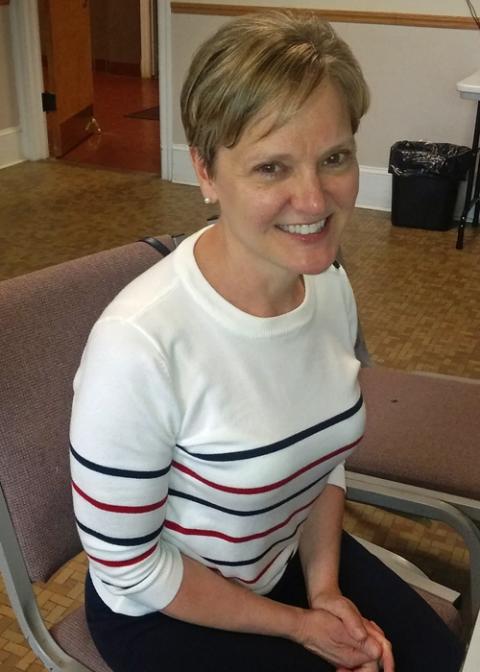
Mia Holman (NCR photo/Peter Feuerherd)
Unusual for a bishop, Chaput is unafraid to wade into political waters, even if it often doesn't play well in liberal Catholic quarters.
He is known to personally reply to email inquiries and comments. Soon after the 2016 election, Holman sent the archbishop an email blaming him for the victory of Trump, made possible in large part by the Republican triumph in Pennsylvania. During the campaign, Chaput strongly criticized Hillary Clinton. He also was critical of Trump, but some Democrat-leaning Catholics suggest that critique was more muted.
Chaput, according to Holman, responded that she was ignorant.
Chaput supporters argue that the archbishop's political takes — sometimes given in front of friendly, more traditional Catholic groups such as the Napa Institute, where he is a headline speaker — are more subtle than he is given credit for.
"One candidate — in the view of a lot of people — is an eccentric businessman of defective ethics whose bombast and buffoonery make him inconceivable as president. And the other — in the view of a lot of people — should be under criminal indictment," Chaput wrote in the midst of the 2016 campaign.
After Trump was elected, Chaput urged Catholics to avoid what he described as virulent opposition, decrying what he said was verbal and physical abuse visited upon the president's supporters. While other bishops have attacked Trump's immigration policies, Chaput, while urging family reunification, regularly emphasizes that there are good people on both sides of that issue, a concession he doesn't routinely make on culture war issues such as gay rights and abortion.
He suggested the University of Notre Dame offer Trump an honorary degree, like it did for Obama.
In one way, Chaput has practiced what he preaches. Catholics need to fill the public square, he regularly argues, and he wrote a book about the subject.
"Stuffing your Catholic faith in a closet when we enter the public square or join a public debate isn't good manners," he said in an address to Catholic lawyers in Harrisburg. "It's cowardice."
A reputation for coziness with the more traditionalist wing of the church has reinforced the view among some Philadelphians that he is more comfortable with more affluent Catholics in the suburbs than with the urban poor.
Parishioners at multicultural St. Vincent de Paul Church told NCR that Chaput has not been a friend of poor parishes. Not unusual for bishops dealing with a financially hard-pressed church, he has closed urban schools. They argued that his muted tone on immigration and his comments on LGBT concerns have not been welcoming.
Terrance Fulton, a St. Vincent's parishioner and former student at St. Charles Seminary, said the archdiocese educates future priests with little regard for the changing demographics of the church.
African American seminarians, like he was, "don't see people who look like us," said Fulton. There are few minority professors, and liturgies largely consist "of organ and chant. That's all we got." He said that the inclusion of Spanish language and Latino culture in the seminary education is also limited.
Chris Newsome, another African American parishioner at St. Vincent's, said there was initially great hope among Philadelphia minority Catholics upon the appointment of Chaput, the first Native American to be appointed to such a church position.
He applauded Chaput's Capuchin Franciscan simplicity, a far cry from his predecessors, known for reveling in the prince-like lifestyle of a large city cardinal. Chaput, after selling archbishop's mansion, now resides in the seminary.
Richard Taylor, a St. Vincent parishioner who has been part of archdiocesan commissions, said that there is an extensive network of consultation bodies, but little real lay input. A committee on race relations that he was a part of had no people of color as members. Other St. Vincent parishioners noted that the archdiocesan Martin Luther King Jr. annual celebration is held in a suburban parish, often hard to reach by African American Catholics living in the city.
"He was very clear he was here to minister to those willing to abide by his viewpoints who are already in the pews."
—Susan Matthews
Church reformers in the suburbs — such as Susan Matthews, a founder of Catholics 4 Change, formed in response to the sex abuse crisis — say that much of Chaput's decision-making was done with little consultation.
Matthews credited Chaput for putting the archdiocese on a firmer fiscal footing, making hard decisions about closing parishes, consolidating offices and selling property. But his style has been an issue.
"More graciousness could have been extended to people he disagreed with," said Matthews.
Chaput has at times responded well to the sex abuse crisis, but often on his own, and only at times after being publicly challenged to do so, said Matthews.
She said that Chaput's identification with cultural conservatism has left a message that he prefers a smaller, more perfect church, in contrast to Francis' pleas for a larger, more diverse church open to all.
"He was very clear he was here to minister to those willing to abide by his viewpoints who are already in the pews," she said.
"He's done a great job of managing the archdiocese."
—Charles Zech
Charles Zech, professor emeritus in church management at Villanova University, credited Chaput for making the hard decisions that have put the archdiocese on firmer financial ground.
"He's done a great job of managing the archdiocese," Zech told NCR. When Chaput came to Philadelphia, the archdiocese faced a $17 million deficit, said Zech, with pension funds for priests and lay employees that were in danger of dissolving.
Those problems have been addressed. Zech said the archdiocese now operates with a small surplus. The decisions were done not without pain. Schools were closed, many of them in the city, where competition from tuition-free charter schools proved to be insurmountable. Chaput's raising of archdiocesan assessments proved unpopular with many pastors.
Unlike his predecessors, Zech said that, at least on financial issues, Chaput was transparent, willing to share the bad financial news with Philadelphia Catholics. And in cases where clergy and lay employees were found to be stealing archdiocesan and parish funds, he reported them to law enforcement.
Chaput declined to speak with NCR for this article, with an archdiocesan spokesman stating the archbishop didn't want to speculate about his legacy at this time of leadership transition. But Chaput supporters in the archdiocese were willing to sing his praises.
For Christina Barba, founder of The Culture Project, a Philadelphia-based Catholic young adult ministry, the archbishop is "a clear truth speaker" who feels obligated to present Catholic doctrine in unambiguous ways.
"But he doesn't end it there," she told NCR. "He says it's up to young people to get other young people."
She said that one can be supportive both of Francis and Chaput, and that the archbishop freely quotes the pope in his homilies. "It's not either/or," she said. "I can love them both and learn from both of them."
Chaput has been unusual in his accessibility, she said. At the 6:30 p.m. Mass at the downtown cathedral, he is available for confessions and chats with many of the young adults who attend. And he will spend hours responding to emails from his flock, a change from his immediate two predecessors, who developed reputations for being aloof and distant.
Michael Moreland, a law professor at Villanova University, said Chaput, while he may have a combative public personality, is personally shy and reluctant to brag.
Chaput, Moreland wrote in an email, "hasn't trumpeted his successful management of the archdiocese amid incredibly difficult circumstances."
Daniel Cheely, director of the Collegium Institute at the University of Pennsylvania, said that one of Chaput's major legacies will be his outreach to campus ministries and Catholic discussion groups in the city's secular campuses, such as Penn and Temple University. He brought in FOCUS, a campus ministry group centered on evangelization, and placed emphasis on outreach to secular universities, where there are large numbers of Catholic students.
While Chaput has a well-honed reputation for traditional Catholic views, he thinks differently than some who envision a church in Philadelphia close to its institutional glory days.
"I witnessed many a well-meaning conservative get his hopes dashed when first assuming and then pleading for the Archbishop to resurrect a Catholic culture from an imagined golden era of the twentieth century," wrote Cheely in an email to NCR.
Advertisement
Chaput critics argue that the archdiocese needs a new archbishop with a less top-down management style, ready to evangelize among those Philadelphia Catholics who might be attached to the church but don't share Chaput's views of the ongoing culture wars. They frequently invoke terms such as "servant leader" and look to Francis' style as an exemplar they want followed in archdiocesan leadership.
For Matthews, too many Philadelphia Catholics are numb after years of ongoing shocks about sex abuse crimes and excessive spending among church leaders. Those who remain in the pews are often focused on local parish life. She's found relatively little interest in what Chaput's impending retirement and the selection of a new archbishop might portend. That worries her.
"I am concerned about the apathy of Philadelphia Catholics," she said.
Little Logan Vincent, one of an increasingly fewer number of Catholics in this once most-Catholic of cities, is now baptized into a church on the cusp as new archdiocesan leadership is about to emerge. What kind of church will he be part of? Catholics in Philadelphia await new leadership appointed by Pope Francis. There will soon be another chapter for Catholics in this Philadelphia story.
[Peter Feuerherd is NCR news editor. His email address is pfeuerherd@ncronline.org.]
*This story has been updated to correct Dougherty's last name.








